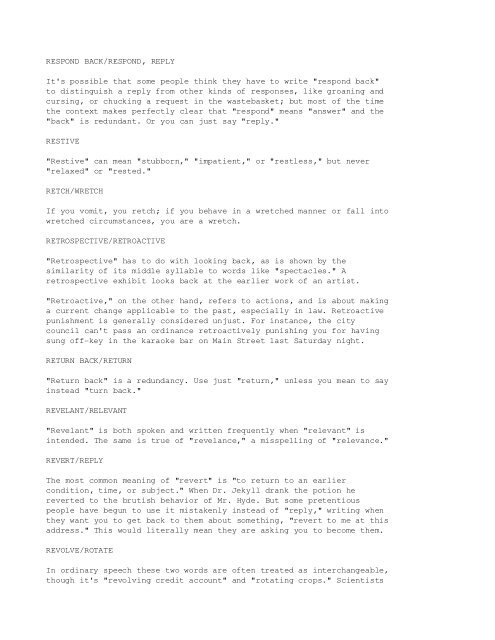Common_Errors_in_English_usage
Common_Errors_in_English_usage
Common_Errors_in_English_usage
Create successful ePaper yourself
Turn your PDF publications into a flip-book with our unique Google optimized e-Paper software.
RESPOND BACK/RESPOND, REPLY<br />
It's possible that some people th<strong>in</strong>k they have to write "respond back"<br />
to dist<strong>in</strong>guish a reply from other k<strong>in</strong>ds of responses, like groan<strong>in</strong>g and<br />
curs<strong>in</strong>g, or chuck<strong>in</strong>g a request <strong>in</strong> the wastebasket; but most of the time<br />
the context makes perfectly clear that "respond" means "answer" and the<br />
"back" is redundant. Or you can just say "reply."<br />
RESTIVE<br />
"Restive" can mean "stubborn," "impatient," or "restless," but never<br />
"relaxed" or "rested."<br />
RETCH/WRETCH<br />
If you vomit, you retch; if you behave <strong>in</strong> a wretched manner or fall <strong>in</strong>to<br />
wretched circumstances, you are a wretch.<br />
RETROSPECTIVE/RETROACTIVE<br />
"Retrospective" has to do with look<strong>in</strong>g back, as is shown by the<br />
similarity of its middle syllable to words like "spectacles." A<br />
retrospective exhibit looks back at the earlier work of an artist.<br />
"Retroactive," on the other hand, refers to actions, and is about mak<strong>in</strong>g<br />
a current change applicable to the past, especially <strong>in</strong> law. Retroactive<br />
punishment is generally considered unjust. For <strong>in</strong>stance, the city<br />
council can't pass an ord<strong>in</strong>ance retroactively punish<strong>in</strong>g you for hav<strong>in</strong>g<br />
sung offkey <strong>in</strong> the karaoke bar on Ma<strong>in</strong> Street last Saturday night.<br />
RETURN BACK/RETURN<br />
"Return back" is a redundancy. Use just "return," unless you mean to say<br />
<strong>in</strong>stead "turn back."<br />
REVELANT/RELEVANT<br />
"Revelant" is both spoken and written frequently when "relevant" is<br />
<strong>in</strong>tended. The same is true of "revelance," a misspell<strong>in</strong>g of "relevance."<br />
REVERT/REPLY<br />
The most common mean<strong>in</strong>g of "revert" is "to return to an earlier<br />
condition, time, or subject." When Dr. Jekyll drank the potion he<br />
reverted to the brutish behavior of Mr. Hyde. But some pretentious<br />
people have begun to use it mistakenly <strong>in</strong>stead of "reply," writ<strong>in</strong>g when<br />
they want you to get back to them about someth<strong>in</strong>g, "revert to me at this<br />
address." This would literally mean they are ask<strong>in</strong>g you to become them.<br />
REVOLVE/ROTATE<br />
In ord<strong>in</strong>ary speech these two words are often treated as <strong>in</strong>terchangeable,<br />
though it's "revolv<strong>in</strong>g credit account" and "rotat<strong>in</strong>g crops." Scientists





